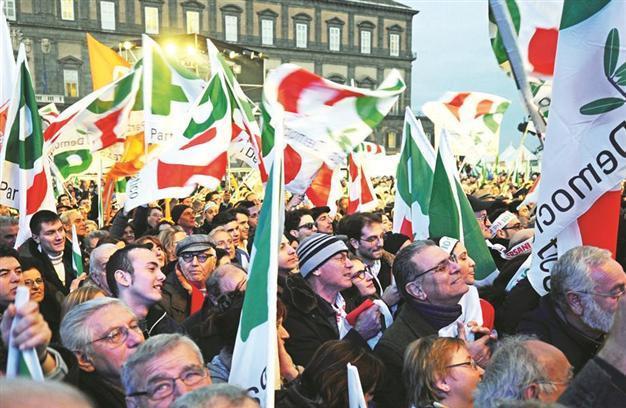Italy braces for nervy elections
ROME - Reuters

Supporters of the Italian center-left Democratic Party (PD) await the party leader, Pier Luigi Bersani, during an electoral rally in Naples. The latest polls give the center-left candidate 34 percent. AFP photo
Silvio Berlusconi’s resurgence and the rise of a foul-mouthed populist comedian have thrown Italy’s weekend election wide open, with deep uncertainty over whether the poll can produce the strong government the country needs.
Italy, the eurozone’s third-biggest economy, is deep in its longest recession for 20 years. Successive governments have failed to revive an economy stagnant for two decades. Public fury over record unemployment, especially among the young, tax increases and economic pain, combined with a recent rash of high-level corruption cases has fanned support for comic Beppe Grillo’s anti-establishment 5-Star Movement.
A skilful Internet user, Grillo has been the most active on the hustings, touring Italy in a camper van on a “tsunami tour,” shouting himself hoarse with obscenity-laced insults at a discredited political class, winning roars of approval from large crowds.
Some analysts say his could be the third-biggest single party in the Feb. 24-25 vote with around 20 percent support, ahead of Berlusconi’s People of Freedom (PDL). Berlusconi, 76, spent most of 2012 in the shadows, undermined by a sex scandal, after he was ignominiously bundled out of power and replaced by technocrat Mario Monti in November 2011 as Italy faced a grave debt crisis.
Bersani leads raceAn average of the most recent polls, which cannot be published in the two weeks leading up to the election, would give the center-left candidate Bersani 34 percent, Berlusconi 30 percent, Grillo 17 percent and Monti between 10 and 12 percent of the vote.
Monti imposed austerity policies and brought borrowing back under control, winning plaudits from European partners. But Berlusconi, the billionaire media magnate, burst back in December in an extraordinary blitz of television appearances, belying his age, that halved Bersani’s 10-point poll lead over the former premier’s center-right coalition. Berlusconi, a born showman and master communicator, backed by a television empire, has won back voters by attacking a hated housing tax imposed by Monti and offering to pay it back, something his opponents say is an impossible vote-buying trick.
Bersani and his Democratic Party have seemed stuck in their tracks, complacent about their lead and unable to respond dynamically to the threat from Berlusconi and Grillo. Pollsters still believe the most likely outcome is a center-left government headed by Bersani and backed by Monti, but the rise of Grillo and Berlusconi, and the outgoing premier’s weak performance, are causing jitters about whether this will produce a strong government committed to reform. Italy may lose momentum on reforms vital to revive growth if no clear winner emerges from the election, credit ratings agency Standard & Poor’s said Feb. 20.
Bersani’s opponents also say he would be unable to agree on reforms with Monti and would be hobbled by trade unions and leftists, something party officials deny. Grillo’s owes much of his success to rage at the failure of lawmakers to keep their promises to transform the economy, change a badly flawed electoral law, cut the privileges of a pampered political class or combat rampant corruption.
Grilli surge may hurt Berlusconi: AnalystsA late surge by Grillo may hurt Berlusconi more than the left and could increase the chances of a more stable Bersani-Monti government. Analysts say that, helped by Grillo’s rise at Berlusconi’s expense, Bersani may even be able to win undisputed control of the Senate or upper house, something which has been in doubt.
Under Italy’s electoral law, Bersani will win comfortable control of the lower house even if he is only just in front of Berlusconi because of a hefty winner’s bonus. In the Senate the bonus is allocated by region, hence the center-right target is to stymie a center-left government in the upper house, which has equal law-making power to the Chamber of Deputies.
FRONTRUNNERS
Pierluigi Bersani, 61, former politician and minister, formed in December 2012 social-democratic Democracy Party and was chosen by 60% of voters as candidate to run for prime minister at his party’s primary ballot.
Silvio Berlusconi, 76, leader of the center-right ‘The People of Freedom Party,’ is a media tycoon and Italy’s former prime minister famous with his corruption trials, sex scandals and political divisions.
Mario Monti, 69, leader of ‘With Monti for Italy,’ a centrist electoral coalition, is the incumbent prime minister of Italy’s technocrat government constituted following the resignation of Silvio Berlusconi on Nov. 13, 2011.
Giuseppe Piero Grillo (Beppe Grillo), primarily known as a comedian, media personality and politician, launched in 2009, the populist “5 Star Movement “ in the Emerald Theatre in Milan.
